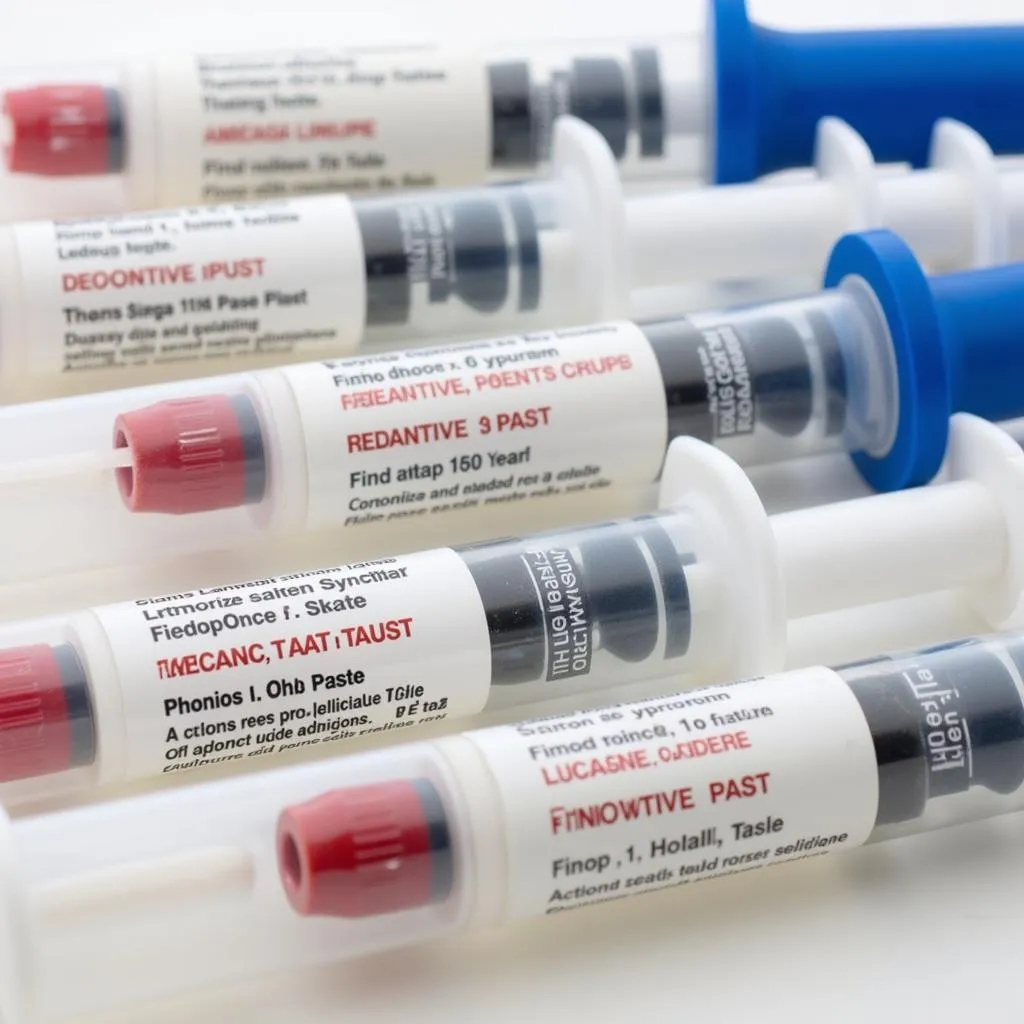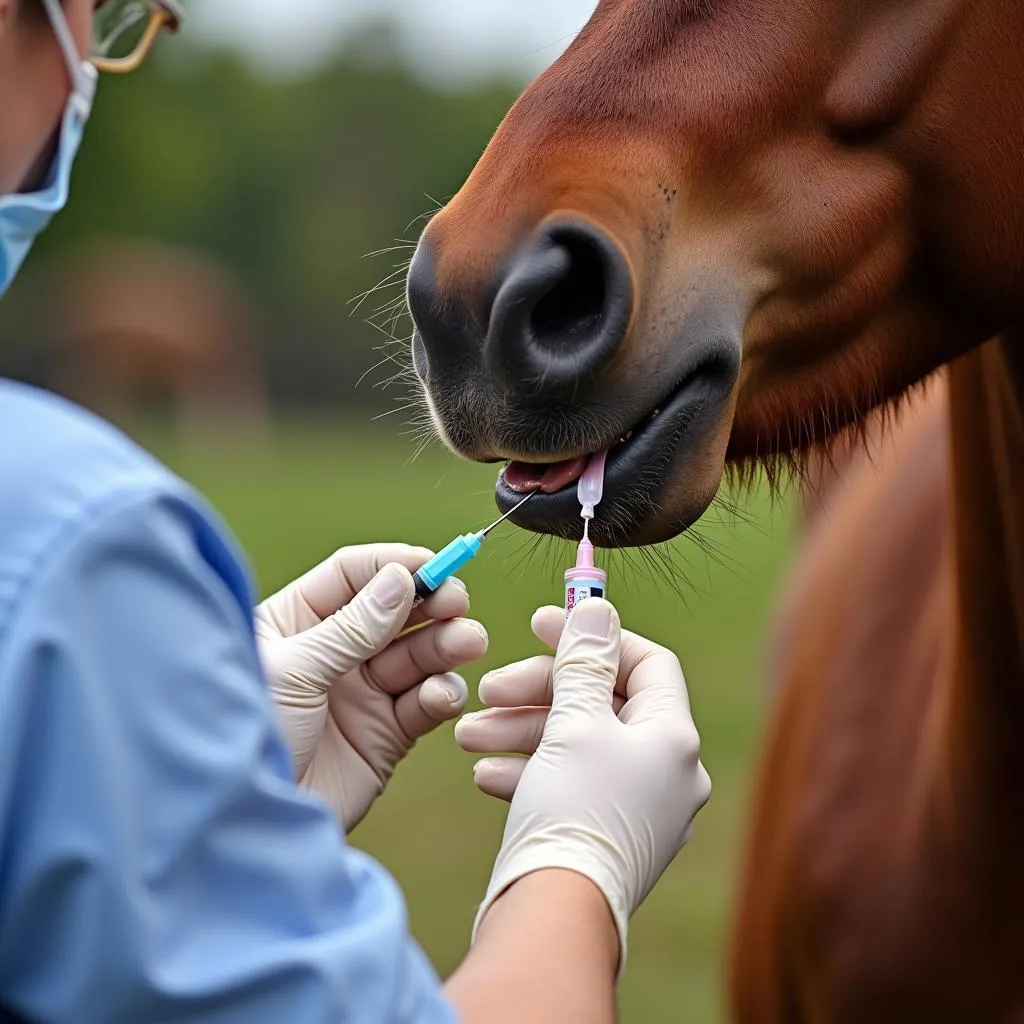Horse Sedative Paste is a commonly used medication for managing anxiety and stress in horses, particularly during transportation, veterinary procedures, or short-term stressful situations. These pastes, often flavored for palatability, contain active ingredients that work to calm the horse’s central nervous system, reducing anxiety and promoting relaxation. While generally safe when administered correctly, understanding the different types, uses, dosages, and potential side effects of horse sedative paste is crucial for any horse owner.
Types of Horse Sedative Pastes and Their Uses
There are various types of horse sedative pastes available, each containing different active ingredients that offer specific effects.
- Acepromazine: This sedative is known for its long-lasting effects and is commonly used for transportation and veterinary procedures. Acepromazine helps calm the horse and reduces anxiety, but it doesn’t offer pain relief.
- Detomidine: This alpha-2 agonist provides sedation and pain relief, making it suitable for pre-veterinary procedures, dental work, and minor wound treatments. Detomidine offers a more profound level of sedation compared to acepromazine.
- Butorphanol: Often combined with other sedatives, Butorphanol acts as a pain reliever and sedative. It’s commonly used for pre-surgery procedures, during recovery, and for managing pain associated with colic.
 Different Types of Horse Sedative Pastes
Different Types of Horse Sedative Pastes
Choosing the Right Horse Sedative Paste
Choosing the right type of horse sedative paste depends largely on the specific situation and your horse’s individual needs. Factors like age, health condition, temperament, and the intended use of the sedative all play a role in determining the most suitable option. Consulting with your veterinarian is essential to determine the appropriate type and dosage for your horse.
Administering Horse Sedative Paste Safely
Administering horse sedative paste requires careful handling and adherence to dosage instructions. The paste is usually administered orally, deposited on the back of the horse’s tongue to encourage swallowing. Always wear gloves when handling the paste and avoid direct contact with skin or eyes.
 Veterinarian Administering Horse Sedative Paste
Veterinarian Administering Horse Sedative Paste
Potential Side Effects and Precautions
While generally safe, horse sedative pastes can cause side effects in some horses. Common side effects might include:
- Lethargy and drowsiness
- Loss of coordination
- Decreased heart rate
- Lowered blood pressure
In rare cases, more serious side effects like allergic reactions, respiratory depression, or paradoxical excitement might occur.
“It’s important to monitor your horse closely after administering any sedative,” advises Dr. Emily Carter, DVM, specializing in equine medicine. “If you notice any unusual behavior, difficulty breathing, or signs of an allergic reaction, contact your veterinarian immediately.”
When to Avoid Horse Sedative Paste
Horse sedative pastes are not suitable for all horses or situations. It’s crucial to avoid using these medications in the following circumstances:
- Pregnant or lactating mares: Unless specifically directed by a veterinarian, sedative pastes should not be used in pregnant or lactating mares, as the medication can potentially pass to the foal.
- Horses with certain medical conditions: Horses with pre-existing health conditions, such as liver or kidney disease, heart problems, or respiratory issues, might require alternative sedation methods.
- Horses showing signs of illness: If your horse is showing signs of colic, fever, or any other illness, consult your veterinarian before administering any medication, including sedatives.
 Precautions When Using Horse Sedative Paste
Precautions When Using Horse Sedative Paste
Conclusion
Horse sedative pastes can be valuable tools for managing stress and anxiety in horses, making veterinary visits, transportation, and other potentially stressful situations less traumatic. However, responsible use requires a clear understanding of the different types, their effects, potential side effects, and when to avoid their use. Always consult with your veterinarian to determine the appropriate type and dosage for your horse’s specific needs, and monitor your horse closely after administering any medication. By prioritizing your horse’s safety and well-being, you can help ensure a calmer and more positive experience for both you and your equine companion.
For any questions or concerns about using horse sedative paste, don’t hesitate to contact us. At Justus Horses USA, we are committed to providing you with the best advice and support for your horse’s health and happiness.
Call us: 0772127271
Email: [email protected]
Visit us: QGM2+WX2, Vị Trung, Vị Thuỷ, Hậu Giang, Việt Nam
Our dedicated team is available 24/7 to assist you.